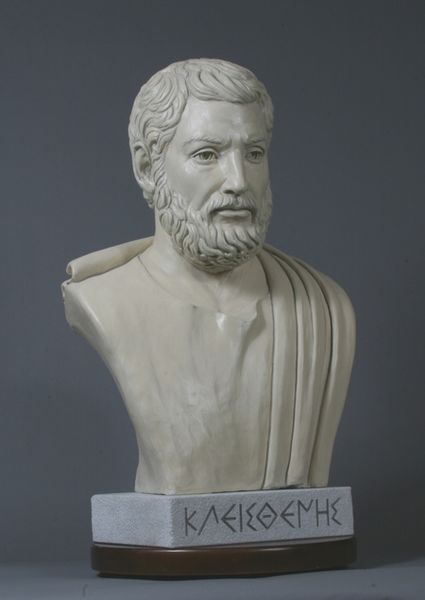<Back to Index>
- Father of Athenian Democracy Cleisthenes (Κλεισθένης), 6th Century B.C.
PAGE SPONSOR

Cleisthenes (Greek: Κλεισθένης, also Clisthenes or Kleisthenes) was a noble Athenian of the Alcmaeonid family. He is credited with reforming the constitution of ancient Athens and setting it on a democratic footing in 508/7 BC. For these accomplishments, historians refer to him as "the father of Athenian democracy." He was the maternal grandson of the tyrant Cleisthenes of Sicyon, as the younger son of the latter's daughter Agariste and her husband Megacles. Also, he was credited for increasing power of assembly and he also broke up power of nobility for Athens.
Cleisthenes was the uncle of Pericles' mother Agariste and of Alcibiades' maternal grandfather Megacles.
With help from the Alcmaeonidae (Cleisthenes' genos, "clan"), he was responsible for overthrowing Hippias, the tyrant son of Pisistratus. After the collapse of Hippias' tyranny, Isagoras and Cleisthenes were rivals for power, but Isagoras won the upper hand by appealing to the Spartan king Cleomenes I to help him expel Cleisthenes. He did so on the pretext of the Alcmaeonid curse. Consequently, Cleisthenes left Athens as an exile, and Isagoras was unrivaled in power within the city. Isagoras set about uprooting hundreds of people from their homes on the pretext that they too were cursed, and attempted to dissolve the council (βουλή, boulê). However, the council resisted, and the Athenian people declared their support of it. Hence Isagoras and his supporters were forced to flee to the Acropolis, remaining besieged there for two days. On the third, they fled and were banished. Cleisthenes was subsequently recalled, along with hundreds of exiles, and he assumed leadership of Athens.
After this victory Cleisthenes began to reform the government of Athens. In order to forestall strife between the traditional clans, which had led to the tyranny in the first place, he changed the political organization from the four traditional tribes, which were based on family relations, into ten tribes according to their area of residence (their deme). Most modern historians suppose there were 139 demes (this is still a matter of debate), organized into thirty groups called trittyes ("thirds"), with ten demes divided among three regions in each trittyes (a city region, asty; a coastal region, paralia; and an inland region, mesogeia). Cleisthenes also abolished patronymics in favour of demonymics (a name given according to the deme to which one belongs), thus increasing Athenians' sense of belonging to a deme. He also established legislative bodies run by individuals chosen by lottery, a true test of real democracy, rather than kinship or heredity. He reorganized the Boule, created with 400 members under Solon, so that it had 500 members, 50 from each tribe. He also introduced the bouletic oath, "To advise according to the laws what was best for the people". The court system (Dikasteria — law courts) was reorganized and had from 201 – 5001 jurors selected each day, up to 500 from each tribe. It was the role of the Boule to propose laws to the assembly of voters, who convened in Athens around forty times a year for this purpose. The bills proposed could be rejected, passed or returned for amendments by the assembly.
Cleisthenes also may have introduced ostracism (first used in 487 BC), whereby a vote from more than 6,000 of the citizens would exile a citizen for 10 years. The initial trend was to vote for a citizen deemed a threat to the democracy, e.g., by having ambitions to set himself up as tyrant. However, soon after, any citizen judged to have too much power in the city tended to be targeted for exile (e.g., Xanthippus in 485 / 84 BC). Under this system, the exiled man's property was maintained, but he was not physically in the city where he could possibly create a new tyranny.
Cleisthenes called these reforms isonomia ("equality vis à vis law", iso = equality; nomos = law), instead of demokratia. Soon after his reforms his life becomes a mystery, as no ancient texts mention him thereafter. It is possible that Cleisthenes himself suffered ostracism, for seeking support from the Persians against the Spartans.
Cleisthenes' ideas revolutionised the way of thinking in Hellas at the time. But even Cleisthenes could not bring full change to Athens, and old institutions of the rich aristoi still existed, such as the areopagus. However, some scholars would argue that modern day western politics are shaped by his work.